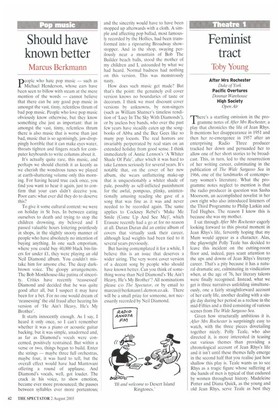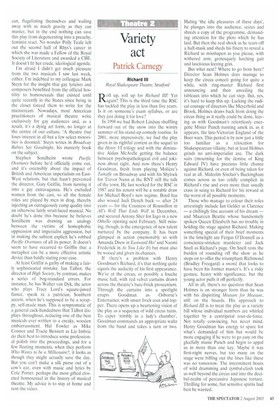Feminist tract
Toby Young
After Mrs Rochester Duke of York Pacific Overtures Donniar Warehouse High Society Open Air
There's a startling omission in the programme notes of After Mrs Rochester, a play that chronicles the life of Jean Rhys. It mentions her disappearance in 1951 and then her re-emergence in 1957 after an enterprising Radio Three producer tracked her down and persuaded her to allow one of her short stories to be broadcast. This, in turn, led to the resurrection of her writing career, culminating in the publication of The Wide Sargasso Sea in 1966, one of the landmarks of contemporary women's literature. What the programme notes neglect to mention is that the radio producer in question was Sasha Moorsom, an accomplished novelist in her own right who also introduced listeners of the Third Programme to Philip Larkin and Ted Hughes. The reason I know this is because she was my mother.
I sat through After Mrs Rochester eagerly looking forward to this pivotal moment in Jean Rhys's life, fervently hoping that my Mum would appear as a character. Alas, the playwright Polly Teale has decided to leave this incident on the cutting-room floor and, indeed, pays scant attention to the ups and downs of Jean Rhys's literary career. That's a pity because it has a natural dramatic arc, culminating in vindication when, at the age of 76, her literary talents were finally recognised. Instead, what we get is three narratives unfolding simultaneously, one a fairly straightforward account of her early life, another dealing with a single day during her period as a recluse in the mid-Fifties and a third consisting of various scenes from The Wide Sargasso Sea.
Given how structurally ambitious it is, After Mrs Rochester is surprisingly easy to watch, with the three pieces dovetailing together nicely. Polly Teale, who also directed it, is more interested in teasing out various themes than providing a chronological account of Jean Rhys's life and it isn't until these themes fully emerge in the second half that you realise just how shallow this play is. Teale wants us to see Rhys as a tragic figure whose suffering at the hands of men is typical of that endured by women throughout history. Madeleine Potter and Diana Quick, as the young and old Jean Rhys, serve Teale as best they
can, flagellating themselves and wailing away with as much gravity as they can muster, but in the end nothing can save this play from degenerating into a preachy, feminist tract. No wonder Polly Teale left out the second half of Rhys's career in which she was made a Fellow of the Royal Society of Literature and awarded a CBE. It doesn't fit her crude, ideological agenda.
I'm afraid I didn't get much pleasure from the two musicals I saw last week, either. I'm indebted to my colleague Mark Steyn for the insight that gay lyricists and composers benefited from the official hostility to homosexuals that existed until quite recently in the States since being in the closet forced them to write for the mainstream. Nowadays, most American practitioners of musical theatre write exclusively for gay audiences and, as a result, it's a dying art form, no longer at the centre of our culture. 'A theatre that loses interest in all but a few select minorities is doomed.' Steyn writes in Broadway Babies Say Goodnight, his masterly book on the subject.
Stephen Sondheim wrote Pacific Overtures before he'd officially come out, and it's ostensibly about the impact of British and American imperialism on EastWest relations, but that hasn't prevented the director, Gary Griffin, from turning it into a gay extravaganza. He's excluded women from the cast, so all the female roles are played by men in drag, thereby injecting an outrageously camp quality into an otherwise fairly strait-laced musical, No doubt he's done this because he believes Sondheim was drawing an analogy between the victims of homophobic oppression and imperialist aggression, but in making the subtext explicit he's robbed Pacific Overtures of all its power. It doesn't seem to have occurred to Griffin that a metaphor can be a more effective artistic device than baldly stating your case.
At least Griffin is guilty of making a fairly sophisticated mistake. Ian Talbot, the director of High Society, by contrast, makes a series of bog-standard errors. For instance, he has Walter van Dyk, the actor who plays Tracy Lord's square-jawed fiancé, speak in a patrician, Southern accent, when he's supposed to be a scrappy, self-made man. This is symptomatic of a general cack-handedness that Talbot displays throughout, reducing one of the best musicals ever written to a creaky, wooden embarrassment. Hal Fowler as Mike Connor and Tracie Bennett as Liz Imbrie do their best to introduce some professional polish into the proceedings, and for a few fleeting moments, when they perform Who Wants to be a Millionaire?, it looks as though they might actually save the day. But you can't make a silk purse out of a cow's ear, even with music and lyrics by Cole Porter, perhaps the most gifted closeted homosexual in the history of musical theatre. My advice is to stay at home and rent the video.



























































 Previous page
Previous page